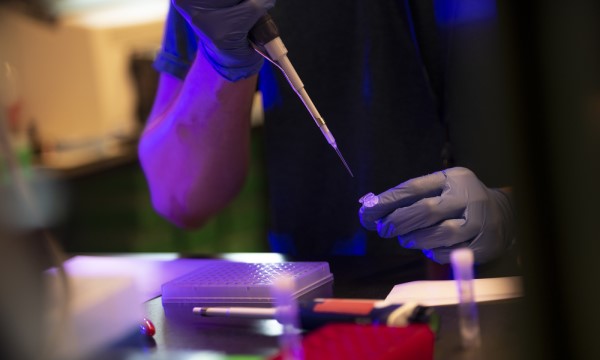Department of Pathology
Center for Integrated Diagnostics


Contact Us
Center for Integrated Diagnostics
Jackson Building, 10th Floor
55 Fruit Street
Boston,
MA
02114
Phone: 617-643-2716
Fax: 617-643-1623
For billing, specimen submission and testing status questions: 617-724-1285
Explore the Center for Integrated Diagnostics
Mission
The Center for Integrated Diagnostics (CID) mission is to work across Massachusetts General Hospital to foster development of clinical actionable diagnostics and accelerate the adoption of personalized medicine. While we have made strides in the cancer field it is our goal to expand our testing to other disciplines.Genotyping Tumors & Targeted Therapies
The primary role of the CID is to genotypically fingerprint patient tumors across the complete spectrum of disease sites in an effort to direct molecularly targeted therapies, thereby enhancing the efficacy of drug treatment offerings as well as supporting prospective clinical trial designs. Patient analyses are performed as CLIA-certified clinical tests and results are generated within a timeframe that allows for direct patient care decision making as well as providing the opportunity for patients whose cancers harbor susceptible genotypes to be offered the most appropriate clinical treatment. In addition, our laboratory pursues retrospective and corollary research studies to support the expansion of our genotyping profiles. To accomplish these goals, the lab utilizes a number of molecular and cellular techniques, including:- Fluorescent in situ hybridization (FISH)
- qPCR
- DNA sequencing
- SNPbased approaches
- DNA sizing analyses
Molecular Diagnostics & Mass General Pathology
In 2005, Mass General's Department of Pathology created the Molecular Diagnostics Laboratory under the direction of A. John Iafrate, MD, PhD. The test offerings started out small; the original two tests were 1P19Q fluorescent in situ hybridization (FISH) and microsatellite instability (MSI). The menu of tests has expanded significantly over time with the key addition of ALK FISH which functions to assist in lung cancer treatment.
In 2008, Dr. Iafrate created the Translational Research Lab (TRL) in collaboration with Mass General Cancer Center. The TRL’s mission was to design a multiplex test that would simultaneously test for the top cancer mutations for all cancer types. The resulting SNaPshot panel tests for 92 commonly mutated loci across 23 cancer genes.
In 2011, clinical molecular diagnostics was unified as the Center for Integrated Diagnostics (CID) at Mass General.
In 2013 the CID rolled out its first next generation sequencing (NGS) assay, AMP translocation, which looks for gene rearrangement of ALK, ROS, and RET. Building on past experience of targeting a specific number of genes in the original SNaPshot Panel and the NGS based technology of the AMP assay, we launched NGS Snapshot in 2014.
The current version of this assay assesses single nucleotide variants and insertions/deletions in 104 known cancer genes, allowing us to provide the most comprehensive clinical assay for actionable cancer genes to date. The laboratory has since continued to expand its NGS assay menu, and now offers comprehensive NGS assays for solid tumors, heme malignancies, and sarcomas.
Licensure & Accreditation
The Center for Integrated Diagnostics has CLIA (Clinical Laboratory Improvement Amendments) certification through CMS (Centers of Medicare and Medicaid Services), and is accredited by the Joint Commission. Please see the Pathology Department Regulatory Compliance website to request a copy of the CLIA certificate. The Center for Integrated Diagnostics is also a New York State CLEP (Clinical Laboratory Evaluation Program) licensed molecular laboratory for performing ROS1 FISH and gene translocation assays, which can generate critical information for treating lung cancer patients. For more information about these assays, please contact the laboratory at the phone numbers listed below.
Leadership & Team
Medical Director, Center for Integrated Diagnostics, Massachusetts General Hospital
Austin L. Vickery, Jr. Professor of Pathology
Vice Chair of Pathology for Academic Affairs
Pathologist in Pathology, Massachusetts General Hospital  Charlotte Wang, MD, PhD
Charlotte Wang, MD, PhD
Assistant in Pathology, Massachusetts General Hospital
Instructor in Pathology, Harvard Medical School
Associate Chief of Pathology Informatics, Massachusetts General Hospital
Assistant in Pathology, Massachusetts General Hospital
Assistant Professor of Pathology, Harvard Medical School
Dora Dias-Santagata, PhD, FACMG
Assistant Molecular Pathologist, Massachusetts General Hospital
Associate Professor of Pathology, Harvard Medical School
Assistant in Pathology, Massachusetts General Hospital
Associate Professor of Pathology, Harvard Medical School
Assistant in Pathology, Massachusetts General Hospital
Assistant Professor of Pathology, Harvard Medical School Adam Fisch, MD, PhD
Adam Fisch, MD, PhD
Assistant in Pathology, Massachusetts General Hospital
Assistant Professor of Pathology, Harvard Medical School
Assistant in Pathology, Massachusetts General Hospital
Assistant Professor of Pathology, Harvard Medical School
Leadership Team
 Julie Miller Batten, MLS (ASCP)
Julie Miller Batten, MLS (ASCP)
Technical Director, Center for Integrated Diagnostics
 Nick Jessop
Nick Jessop
Case Manager, Center for Integrated Diagnostics
Services
Cancer Testing
- SNAPSHOT Cancer Genotyping (NGS): Solid tumor and heme versions available. Tumor development and progression rely on the active involvement of a limited set of signaling pathways; defining the genomic signatures of different tumor types has led to the development of a new generation of gene-targeted drugs. In our laboratory, we have developed an assay which identifies these genomic signatures by detecting mutations in over 100 commonly mutated areas in cancer. The results allow for enhanced molecular sub-classification of tumors, which facilitates the selection of appropriate gene-targeted drugs and enables clinicians to identify suitable clinical trials for their patients. The Snapshot Cancer Genotyping assay is clinically relevant for a wide variety of cancers including lung, colon, breast, brain, pancreas, thyroid, skin, leukemia and more
- Fusion Assays (NGS): Solid tumor, heme and sarcoma versions available. Chromosomal translocations commonly observed in cancer can be identified using high-throughput targeted RNA sequencing (RNA-Seq). Fusion assays developed by the CID use AMP (Anchored Multiplex PCR) technology, which identifies known and novel gene fusions with specific identification of transcript fusion breakpoints and their partners. CID fusion assays provide comprehensive results of actionable translocations, which can be used alongside clinical and pathologic information for diagnostic, prognostic and treatment decisions
- FISH: Fluorescence in situ Hybridization (FISH) detects a variety of chromosomal aberrations in cancer, including genes that have moved (translocations), duplicated genes (amplifications) and missing genes (deletions). Our laboratory offers a wide selection of FISH assays for various cancers types, including lung, colon, brain and soft tissue. The FISH tests that we offer are ALK, ROS1, RET, EGFR, MET, PDGFRA, FGFR1, HER2, EWSR1, CHOP, SYT, FKHR, 1p19q, MYC, KRAS and PIK3CA, CDKN2A
- Microsatellite Instability & MLH1 Promoter Methylation: Microsatellite instability or MSI can occur due to defects in DNA mismatch repair proteins, typically leading to sporadic tumorigenesis in colorectal or endometrial cancers. Subsequent testing for MLH1 promoter methylation status aids in ruling out hereditary nonpolyposis colorectal cancer (HNPCC, or Lynch syndrome). In our laboratory, MSI analysis is performed via molecular and immunohistochemistry techniques
- MGMT Promoter Methylation: The promoter of MGMT, which is a DNA repair gene, can sometimes be methylated or silenced, effecting tumorigenesis. In patients with glioblastoma who are treated with alkylating agents, MGMT promoter methylation
- Hemochromatosis: The CID’s hemochromatosis panel tests for the most commonly associated mutations within the genes related to hereditary hemochromatosis. A correlation of
clinical and genetic laboratory findings is required to determine a diagnosis of hereditary hemochromatosis. Testing is recommended for close family members of individuals
diagnosed with the condition - Chimerism Analysis: Our laboratory uses a microsatellite assay to determine the percentage of donor and/or recipient cells present in the peripheral blood or bone marrow of a
patient subsequent to allogeneic bone marrow or stem cell transplant. After transplant, the relative amount of DNA that is donor versus recipient is quantified and followed over
time with subsequent patient samples to provide prognostic information
Support the Center for Integrated Diagnostics
The Massachusetts General Hospital Center for Integrated Diagnostics providing clinically actionable molecular diagnostics to accelerate the adoption of personalized medicine.

 A. John Iafrate, MD, PhD
A. John Iafrate, MD, PhD Long Phi Le, MD, PhD
Long Phi Le, MD, PhD
 Miguel N. Rivera, MD
Miguel N. Rivera, MD Valentina Nardi, MD
Valentina Nardi, MD